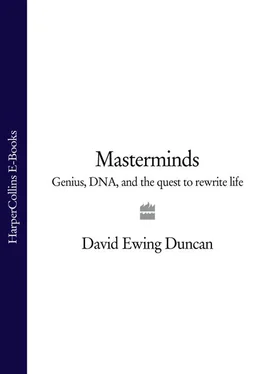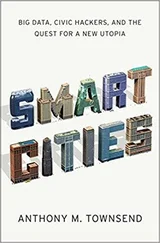“Yeah?” I say, suspended for a moment in the air, feeling that electric rush that says this ball is going to connect, it’s going into the damn basket.
“You are genetically defective.”
I hesitate for all of a split second. He jumps high and grabs the ball, twirls, and races down the court, dribbling and flashing me Erik’s demonic smile.
I’m visiting Kari Stefansson as part of an experiment to unlock the secrets of my own DNA. In due course, I will find out my results. But as I watch him play, his dark green eyes alluring and murderous, I’m struck by a simple revelation. Stefansson in many ways is the early-twenty-first-century equivalent of Erik the Red. He is a marauder and warrior, a larger than life figure who slices through frigid waters in a longboat with an outsized passion to conquer, to achieve glory, and perhaps to get rich, but mostly for the sheer joy of it.
Lest we build him up too much, Kari Stefansson is also just a man. I have seen him tired, and downcast. On one of my visits to Iceland, the stock in his company had dipped down to about two dollars a share, prompting him to fret about an unwanted suitor who might attempt a frontal assault to buy the company out from under him. The Viking was watching his backside—though this Norseman is also a physician who wants to alleviate suffering, if he can. Moody and stormy, he looked depleted after a round of calls to investors and advisors, as if he had been fighting the Furies all day and was still standing, but was exhausted by the effort.
It seems evident that Stefansson’s prickly, infectious personality is crucial to his success in being a scientist and entrepreneur: that peculiar blend of DNA and experience that makes this Viking gene master a genius, bully, and force of nature. As he humbles me by swishing yet another basket, I tease out this idea—that the Stefanssons of this rarified world of scientists and entrepreneurs are driving this era of biological discovery as much as the science itself. This is obvious, though maybe, I think, this is a way to delve into the heart of the matter with genetics: to tease out first what is the crux of the science, and the implications of the discoveries for us humans, by trying to understand its creators—the Prometheuses bringing us fire, the Faustuses taking us to either heaven or hell, the Eves about to bite into another apple on the Tree of Knowledge, and the Erik the Reds blustering about and trying to score big with basketballs and nucleotides.
Here is a man who has glimpsed my most intimate secrets, my DNA, those unique combinations of chemical compounds that make me me: my blue eyes, a crooked left second toe, a tendency to be far more curious than is healthy. I also have this flip in my left eyebrow that my grandmother once called “the lick of God.” All the men in my family for at least five generations have had this upward spike in our left eyebrow that points straight up in the air: My great-grandfather, Harry, had it, my grandfather, my dad, me, and my two sons. Genes are not the only factor; the environment I live in also plays an enormous role: the food I swallow, the gasoline fumes I breathe in when I fill up my gas tank, the ultraviolet rays that permeate the ozone and burn the skin on my nose. But it’s my genes that are the basic ingredients that make me both human and unique—and I’ve just handed them over to Erik the Red.
Stefansson’s aim in Iceland is to unravel genetic secrets from the island’s entire population, looking for patterns in genes that might account for diseases such as stroke and osteoporosis. Thanks to meticulous genealogical records kept for one thousand years in Iceland and collected by deCode into a computerized database they call the Islendingabok , the “Book of Icelanders,” Stefansson can tap into what medical and mortality details exist about the 680,000 people who have lived on the island since the first Vikings arrived here in the ninth century. deCode uses powerful computers to pick out how families inherited disease. The company also has assembled another database containing certain medical details about modern-day patients, with consent, that pertains to diseases deCode is studying. Iceland’s parliament, the Althing, has created an oversight process to protect patient privacy, and to allow patients access to their genetic test results, where it is appropriate. About 110,000 Icelanders so far have willingly handed over their DNA for the program, which asks, for instance, patients with asthma to provide their medical records and their DNA to be tested for nucleotides that are anomalous when compared to the nucleotides of the nonasthmatic population. This provides clues to where the disease-influencing genes might be located. The company has roughly mapped the location of several dozen suspect genes, and has found the exact location of a few major diseases, such as stroke and osteoporosis—news that was important enough that these discoveries landed on the front page of the New York Times when each was announced in 2003.
So I am hardly alone in being tested by Stefansson’s labs and computers, though what sets me apart is that I’m the first healthy person with no family predisposition to be tested by deCode and to have my results announced publicly. I’m also not the first person to take tests for specific genetic diseases. More and more, tests are offered that identify genes linked to Alzheimer’s disease, Huntington’s chorea, breast cancer, and other maladies. Except for Huntington’s, which has a 100 percent “penetrance”—the certainty of which people who have a mutation will get the disease—most of these tests offer only the possibility that a person will get the disease. For instance, testing positive for the apo-e4 gene, which is associated with Alzheimer’s, a person has a two-and-a-half times to ten times greater chance of getting the disease than a normal person. So this is not necessarily deterministic information but, rather, offers up probabilities that you or I will get a disease.
These genetic tests fall under the rubric of “personalized medicine”—which offers not only tests for genetic predispositions to disease, but also the possibility of customized treatments. So drugs could be targeted to your specific malady and genetic makeup rather than the one-size-fits-all medications of today. Yet this is only the bare beginning of what scientists are offering up as future possibilities in this nascent age of genetics. You and I and our children may soon be living in a world where damaged hearts and shattered spines are routinely regenerated or spare ones are regrown using stem cells; where a human egg containing a person’s DNA can be engineered by adding and subtracting genes; where genetic fixes or perhaps a pill can be popped to extend life span and keep one young, fit, and lean up to age 150, or 300, or longer. The possibilities are thrilling in some cases and frightening in others, particularly since the collective knowledge of genetics and the impact of mucking with the basic recipes of life remain fantastically complex and largely unknown.
This creative fire in biotechnology is occurring after a half-century of biological discoveries and more recent technological breakthroughs, combined with an unprecedented surge of funding from government and the private sector, and supported by a society that loves the gadgets, the medical miracles, and the standard of living afforded by modern science, even if the pace of change sometimes makes us feel uneasy. The outcome of this explosive moment in genetics is anybody’s guess: a brilliant future or, if something goes terribly wrong, a nightmare. Or both. We will cure cancer; vanquish AIDS, malaria, and tuberculosis; increase life span to three hundred years; eliminate pollution; and feed everyone on the planet. Or we will create a monster, either inadvertently or deliberately. Maybe we’ll do it all. I believe this is the greatest story of our time, perhaps of all time. A species is developing the tools to redesign itself, to self-evolve in a way Charles Darwin never imagined.
Читать дальше












